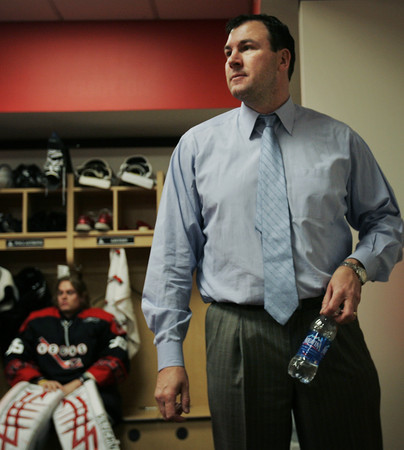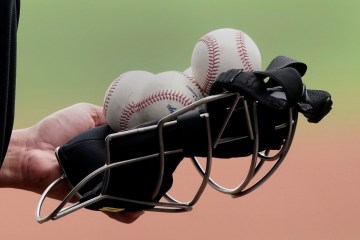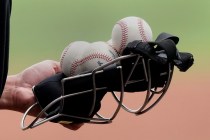NHL begins taking head hits seriously
NEW YORK -- Keith Primeau is linked to the late Reggie Fleming though their NHL careers were separated by decades.
When severe brain injuries are the common thread, there is no generation gap. The problem isn't new, it's just finally starting to become understood.
While the NHL Players' Association has pitched a ban of all hits to the head, the league hadn't moved to adopt such a rule. But for the first time, change appears possible. The 30 NHL general managers agreed last month to form a committee to investigate the problem before they meet again in March. They could then recommend that head shots be eliminated.
A new rule might even be in place next season that would prohibit contact with the head -- even with a shoulder.
The general managers will gather against a backdrop of America's most popular professional league, the NFL, making several new moves to study head injuries and protect players in the wake of new studies and congressional pressure.
"If you would've asked me four months ago, my response was one of frustration because I didn't think that they were taking initiative," Primeau said of the NHL. "After their GM meetings they came out of there with a plan. That plan, because it's 30 general managers, will take some time, but they are working toward a goal. That, for me, is encouraging."
The 6-foot-5-inch, 235-pound Primeau was a hard-hitting center with a scorer's touch over 15 NHL seasons. His career was ended not by a bum knee or tricky shoulder, but by repeated concussions. His symptoms have included lightheadedness, disorientation, and added difficulties when his immunity goes down.
"When I get sick it goes straight to my head," said Primeau, 38, now director of player development for the Las Vegas Wranglers of the ECHL.
His story isn't unique, and as more research is done, the danger of concussions and their long-term effects becomes increasingly clear. Concussions plagued the careers of Hall of Famer Pat LaFontaine, Eric Lindros and his brother Brett, goalie Mike Richter, defenseman Jeff Beukeboom and countless others.
"I know that I damaged my brain," Primeau said. "To what degree, I don't know. What my future holds, I don't dwell on it."
Primeau was aware that Fleming, whose 12-year NHL career ended 20 years before Primeau's started, had a severe brain disease before findings by Boston University researchers were revealed last week.
Fleming was 73 when he died in July, and he was the first hockey player known to have chronic traumatic encephalopathy (CTE), a neurodegenerative disease often linked to boxers that causes cognitive decline, behavioral problems and dementia.
Because such research can only be done after death, Primeau has agreed to donate his brain to science.
His career-ending concussion, on a hit by Montreal's Alexander Perezhogin, occurred nine games into the 2005-06 season while he was with the Philadelphia Flyers.
Primeau is better now than when he hung up his skates in 2006, but not 100 percent.
"Day to day I am in a much better place that I was even a year ago," he said. "It was certainly a long road and there were days when I thought that I was never going to feel well enough or healthy enough to live as normal a life as I've been able to."
Primeau's greatest frustration is that he can't exercise the way he once could. Increasing his heart rate triggers some of symptoms, he said.
Several NHL players have been sidelined this season by concussions or related symptoms. Chicago captain Jonathan Toews, New York's Chris Drury, Edmonton's Sheldon Souray, Steve Staios and Robert Nilsson, and Florida's David Booth, have been knocked out from blows to the head.
Team owners have lots to lose when well-paid players are out for long stretches of time. The Minnesota Wild have been without Andrew Ebbett, Petr Sykora, Pierre-Marc Bouchard and defenseman Brent Burns because of concussions.
"Our goal is to really frame where this is for the owners and team presidents," said Colin Campbell, the NHL's director of hockey operations, who made a presentation at last week's owners meeting. "It's their players they're losing through these hits and concussions."

















